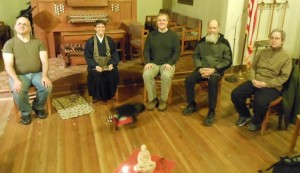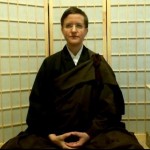 Last night was the first meeting of my Zen Center’s “Downtown Portland Group.” Over the course of one short evening, an ideal manifested as something actual. The strange thing was it didn’t feel dramatic or particularly significant to me. Instead, it felt somewhat uncomfortable, somewhat normal, and just as constrained by my humanness as everything I have ever done. In other words, ordinary – in the sense of “neither very good nor very bad, not particularly impressive or special.”
Last night was the first meeting of my Zen Center’s “Downtown Portland Group.” Over the course of one short evening, an ideal manifested as something actual. The strange thing was it didn’t feel dramatic or particularly significant to me. Instead, it felt somewhat uncomfortable, somewhat normal, and just as constrained by my humanness as everything I have ever done. In other words, ordinary – in the sense of “neither very good nor very bad, not particularly impressive or special.”
At one point Rev. Paul Davis, the outreach minister at the church, had us gather a little closer together so he could get a snapshot of our little group for his weekly email newsletter. We sat in wooden chairs in a circle around a buddha statue and candle that were placed in the center on the floor. My little dog wandered around us. At the time I thought, “Great. Only two new folks showed up. The rest of the group are actually people who already practice with Bright Way Zen at our zendo. I really don’t know what I’m doing. Now there will be an inspiring picture I can share that will give the impression this is an amazing thing when it’s not. ”
And yet, just because I felt that way, was that the truth of the situation? Is there something revealed in pictures that eludes our perception when we’re actually involved in something? Do we tend to see our lives as merely “ordinary” and miss much of what is remarkable and beautiful about them? This reminds me of something Shunryu Suzuki said about Zen practice: “If you continue this simple practice every day you will obtain a wonderful power. Before you attain it, it is something wonderful, but after you obtain it, it is nothing special. It is just you yourself, nothing special.” (1)
Our meeting lasted an hour and started with 15 minutes of silent meditation. Silent, that is, except for my occasional guiding comments to the group as a whole. There was one new person with no meditation experience who was somewhat physically restless. I took that as a sign meditation was challenging for her and wanted to offer some clue as to what we were supposed to be doing (or not doing). I dislike talking in zazen (seated meditation) because the silence itself feels so sacred and transformative to me, but sometimes people find it very helpful. Of course, I’ve seen people appear very physically uncomfortable during meditation but later had them describe the experience as quite pleasant and calming, so who knows?
We then did introductions and a short reading from Rick Hanson’s book Just One Thing called “Notice You’re All Right Right Now.” (2) That sparked some discussion, particularly around how to feel “alright” even when you need to be vigilant about potential threats in your surroundings. Most of us seemed to agree that there was a way to be vigilant without anticipation and fear, so even though you were watchful and ready to defend yourself, you could also be, in some way, alright. Another question arose about how to be alright when you have to be around someone who has been aggressive or hurtful to you in the past. I’m not so sure the questioner put any stock in my suggestion to practice acceptance of the fact that we aren’t likely to feel “alright” in that situation, and to not resist the fact that, because of our history with the hurtful person, we continue to feel some discomfort in their presence.
We then closed with a guided meditation. In future weeks I hope to offer a little snack and maybe some tea afterwards, but after this first meeting we just cleaned up, chatted a little, and dispersed. One of the new folks asked, sounding somewhat incredulous, “Are you going to do this every week?” With more confidence than I felt I answered, “Yes!”
This downtown offering feels in many ways like the other meditation and study meetings at my Zen Center. What feels different, essentially, is that the door is open much wider. Bright Way’s zendo in one of Portland’s westside suburbs is most easily accessed by car. Although it’s on a bus line, people using mass transportation usually have to be pretty determined to come. To get there requires a some degree of financial means, organizational skills, and psychological stability. And once you have a group of people who meet that criteria, they attract more people like them.
The downtown group, on the other hand, is located right smack-dab in the middle of an area where many people struggling with poverty, addiction, and mental illness are used to coming for meals, shelter, and other services. The signs and flyers emphasize “FREE” and say, “Special invitation to anyone who is living outside, but all are welcome.” When I left the group last night there were three people sleeping on the ground outside of the church, one of them literally right next to the door you would use to come to the meditation group. (Just because the door is “open” doesn’t mean someone won’t opt to stay outside in order to nab a relatively good spot for the night!)
I hope this wide open door means that the people who end up coming to the downtown group will represent a wider spectrum of humanity than the people who come to my suburban zendo (as lovely as they are!). So far it looks like they will.
This offers an important challenge to my own practice: learning to “be alright” even when I don’t know what to expect from people. It’s one thing to stay present and open with people who more or less share my understanding of the world, and who are likely to behave within a commonly held set of parameters. There may be the occasional person who shows up in the suburbs with somewhat bad manners, or who commandeers the conversation to focus the group on their agenda. Occasionally people are painfully shy, or have funny little personality quirks. It’s extremely rare for someone to come who clearly operates, at least at times, within a version of reality that does not much resemble the perceived realities of the people around them. Or who is unaware of our precious “commonly held parameters for behavior” – or unable to follow them even if they are aware of them.
In a group setting, people who are significantly less likely to behave as we expect can be somewhat disruptive. An appropriate response to them always has to balance concern for the individual with taking care of the experience of the group. However, it warms my heart when I see a group gracefully and compassionately absorb some disruption. What a wonderful thing for both the individual and the group! The individual experiences acceptance and inclusion, while the group gets the opportunity to remember life is not something we get to control, and that when we embrace the unexpected we taste what aliveness really is.
(1) Zen Mind, Beginner’s Mind, Shunryu Suzuki, Weatherhill Press, 2002 (2) Just One Thing: Developing a Buddha Brain One Simple Practice at a Time, Rick Hanson, New Harbinger Publications, 2011












